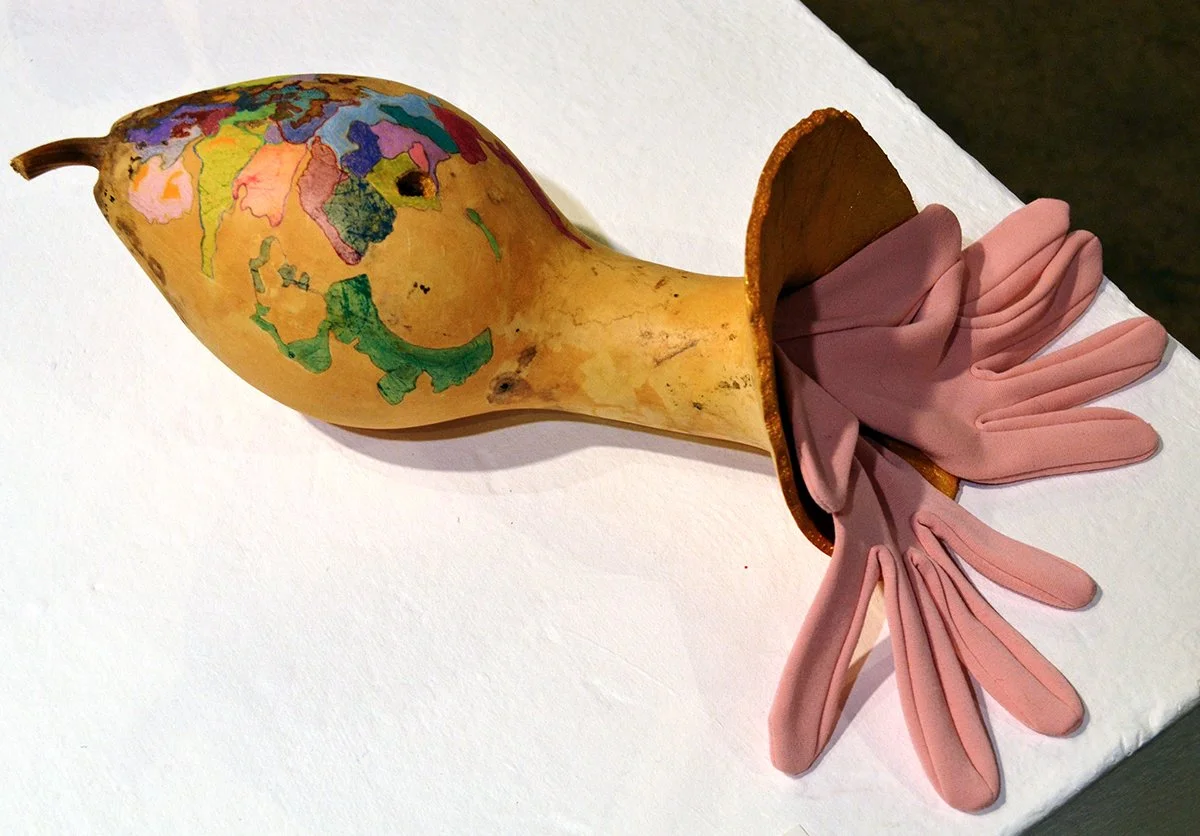Modern Love
Frank Martinez: Modern Love
Space Gallery
400 Santa Fe Drive, Denver, CO 80204
December 1, 2023-January 13, 2024
Admission: Free
Review by Paloma Jimenez
I’ll never claim that painting is dead, but some genres desperately need emergency CPR. The majority of contemporary geometric abstraction can feel lifeless, having been drowned by predictable optical illusions and overwrought color theory—may those paintings rest in peace inside an art investor’s climate controlled storage unit. If you too have grown weary of the painters who play uninspired poker with Pantone color chips, then Frank Martinez’s collection of paintings at Space Gallery might shine some light onto your winter blues. Modern Love glows with a playful curiosity about life’s colorful offerings.
An installation view of Frank Martinez’s exhibition Modern Love at Space Gallery in Denver. Image by Paloma Jimenez.
Teetering compositions rustle around for balance inside the edges of the canvases. A sliver of space between two rounded corners makes all the difference. In fact, many of the interactions between Martinez’s peculiar shapes evoke the amicable tension between strangers at a mutual friend’s party: timid smiles, relieved acknowledgement of shared interests, limbs floating in an unconscious dance. Abstraction has always been a handy vehicle for exploring some of these more ineffable, layered emotions.
Frank Martinez, Untitled 9-24, acrylic on canvas, 96 x 72 inches. Image by Paloma Jimenez.
Untitled 9-24 stands out as one of the larger pieces in the exhibition and displays Martinez’s mercurial process. As the only painting with a stretch of unpainted canvas visible, it exists within a liminal aesthetic space. Hard neon stripes and whispering black lines meet on an uncertain white field. Painter’s tape blue acrylic paint rips down the right side of the painting—the visual boundary comes as a relief in this mentally demanding piece. By referencing various styles, but ultimately deciding to prioritize none, the confident Untitled 9-24 discards rapid legibility and pursues more complex, contradictory thoughts.
Frank Martinez, Untitled 11-19, acrylic on canvas, 72 x 60 inches. Image by Paloma Jimenez.
Frank Martinez, Untitled 11-7, acrylic on canvas, 36 x 30 inches. Image by Paloma Jimenez.
Pensive intersections abound in Modern Love. The corners of shapes become meeting points for unlikely color collisions. In Untitled 11-19 the straight edges of magenta, pea soup green, popcorn yellow, and an oscillating blue slide past one another like a pile of pages cut out of a magazine. Martinez is well aware of the gravitational qualities of color, using them to compose works without focal points. The singular red occupying the bottom left corner of Untitled 11-7 lifts up the anchoring weight of the more muted greens, blue, and black.
A view of works by Frank Martinez on the black walls at Space Gallery. Image by Paloma Jimenez.
Frank Martinez, Untitled 11-1, acrylic on canvas, 11 x 14 inches. Image by Paloma Jimenez.
Black walls hold space for some of the other paintings in the exhibition as well. Rather than letting it absorb the surrounding colors, Martinez uses black to offer visual direction. On one of the black walls hangs a small painting, Untitled 11-1. Sandwiched between the rounded edges of reflective blue and slightly bruised pink, a hint of beguiling orange struggles to peek through the sloping black. A punchy green line runs across the shapes’ bottom perimeter, holding the layers together. The subtlety of these little details lends Untitled 11-1 an anticipatory atmosphere.
Frank Martinez, Untitled 11-10, acrylic on canvas, 16 x 12 inches. Image by Paloma Jimenez.
The larger areas of color in Martinez’s paintings wouldn’t work so well if it weren’t for those smaller veins of hues running parallel to the shapes. Not quite outlines, the strips often carry remnants of dark gestural strokes layered underneath a brighter splash. Slivers of orange and an unsteady neon green splice the two sides of Untitled 11-10 together. Rendered in potentially dissonant colors, the orange bridges the gap with humorous aplomb.
Frank Martinez, Untitled 11-9, acrylic on canvas, 16 x 12 inches. Image by Paloma Jimenez.
In Modern Love, Martinez consistently employs the buoyant comedy of the color orange. The surface of Untitled 11-9 reads like the peeling layers of a billboard in the tropics with a jagged stretch of neon orange licking at the bottom. A discomforting red line extends just past the end of a dark shape. These moments of specificity throughout the exhibition lend an idiosyncratic touch to the works.
An view of Frank Martinez’s exhibition Modern Love. Image by Paloma Jimenez.
Frank Martinez has found a fruitful meeting point between sweeping gestures and measured precision. By exploring the infinite intricate relationships between colors, he presents us with a refreshing—and sometimes disorienting—perspective on the non-objective image’s ability to hold up a mirror to the multifaceted experience of being alive.
Paloma Jimenez (she/her) is an artist, writer, and teacher. Her work has been exhibited throughout the United States and has been featured in international publications. She received her BA from Vassar College and her MFA from Parsons School of Design.
















